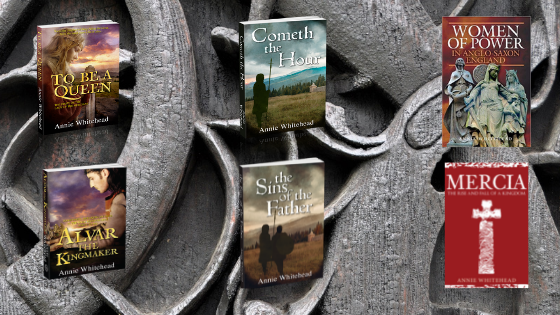Most people, I suspect, who saw this word would not have a clue what it means or how to say it, much less what it means: þrīe. Similarly, this word: mōnaþ
But if we start with some pronunciation hints, then it gets easier. The þ is a th sound. So mōnaþ is month. I'll come back to þrīe later.
Other words still in use today are also fairly unrecognisable in their original form: dæg and geong.
If I said, "Se mann is eald", I might not be understood. But if I tell you that g is often a soft y sound, then you'll know that dæg means day. And armed with that fact, and that "Se mann is eald" means the man is old, then deciphering geong might become easier if we say "Se mann is geong." Yes, geong means young.
So now we know that þ is equivalent to th, we can work out what broþer means. Especially if we see it alongside other words: fæder, mōdor, broþer, dohtor.
Wudu on its own doesn't look much like a modern word. But if we team it with ford and weald, then we have wood, ford and forest. Ford and weald are both in use today.
Going back to þrīe. If you haven't worked it out already, let me put it with its friends:
ān
twēgen
þrīe
fēower
fif
siex
seofon
eahta
nigon
tien
It doesn't always work though. The numbers 1-10 might now be recognisable, but although mōnaþ is now clearly month, it's only vaguely helpful here:
Æfterra Gēola
Sol-mōnaþ
Hrēþ-mōnaþ
Easter-mōnaþ
Þrimilce-mōnaþ
Ærra Līþa (and Þrilīþa which is a sort of leap-month!)
Æftera Līþa
Weod-mōnaþ
Hālig-mōnaþ
Winterfyllēð
Blōt-mōnaþ
Ærra Gēola
However, look at the first and last of the list of months. Remember that G is a soft y sound, and you'll see Yule. Specifically, After-Yule and Before-Yule. Also see if you can spot Holy-Month and Blood-Month. Now that you know before and after, then the middle months, before and after Līþa, make sense as being before and after something, in this case, midsummer.
Eald and geong, once we know about pronunciation, can morph easily into old and young.
But another of pair of words is not so easy: lytel and micel. You can probably work out little, but what about micel, which means great? Well, it does still exist in a modern form, as the dialect word muckle.
There are other words which seem far removed from their modern counterparts. Dōm, for example, meaning judgement. But if we remember the rather more archaic word doom, then it makes sense.
As I said, context is everything. I recently went into the local school where I teach and read them this:
Fæder ūre, þū þē eart on heofonum,
Sī þīn nama gehālgod.
Tō becume þīn rice.
Gewurde þīn willa
On eorþan swā swā on heofonum.
Urne gedægwhamlīcan hlāf syle ūs tōdæg.
And forgyf ūs ūre gyltas,
Swā swā wē forgyfaþ ūrum gyltendum.
And ne gelæd þū ūs on costnunge, ac alȳs ūs of yfele
soþlice.
Fæder ūre is the giveaway, especially if we switch those two words around, which gives us 'Our Father' and suddenly eart on heofonum looks more like 'art in heaven'. Of course, now that we know that dæg means day, tōdæg shouldn't present a problem. Some of the pupils guessed what it was, but if I'd shown them this to start with, I think they'd have been stumped.
Even so, once we know some of the strange Old English letters and some basic pronunciation rules, then this line
si þin nama gehalgod (think: si thin nama ye-halyod) reveals itself to be 'hallowed be thy name'.
As I said, I am far from an expert (and should point out that there are other Old English letters, one of which, ð, can also be th) and can only pick out the odd word or phrase. This post is just meant to be a bit of fun. But Old English, when you look closely, does very often translate easily into modern English. It's just a question of looking closely, and sometimes joining up a few dots.
So, here's one to leave with you, and if you follow the rules above, you should have no problem working it out: þrītig*.
[Thanks to Dawn Burgoyne for permission to reproduce here her wonderful version of the Lord's Prayer which she wrote out and illuminated for me. Spellings of OE words taken from A Guide to Old English by Bruce Mitchell & Fred C. Robinson. *thirty]

